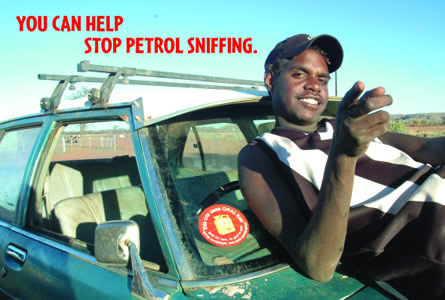![]()

THURSDAY 20 OCTOBER 2005
LAUNCH OF NATIONAL CAMPAIGN TO HELP STOP PETROL SNIFFING
Australians for Native Title and Reconciliation (ANTaR) and The Australian Greens today launched a national campaign to help stop petrol sniffing in remote Aboriginal communities.
The campaign encourages Australians to send postcards to the Prime Minister urging him to roll out unsniffable Opal fuel throughout the Central Deserts region of central Australia.
Fifty thousand postcards have been produced and are available throughout the Avant Card national distribution network at cafes, cinemas and other venues. An electronic version of the card is available via the ANTaR website here>>.
ANTaR National Director, Dr David Cooper said the introduction of Opal would significantly reduce sniffing if it was the only fuel available in the region especially in major towns like Alice Springs and Tennant Creek.
“The Government is fond of saying it supports practical reconciliation, but there can’t be anything more practical than introducing Opal fuels to reduce petrol sniffing in Central Australia,” Dr Cooper said.
“Although rolling out Opal fuel is not the total solution to the problem, there’s no doubt it would be a major factor in saving lives in Central Australia,” Dr Cooper said.
Greens leader Senator Bob Brown said that there was no good economic, social, business or other reason not to roll-out Opal petrol across Central Australia.
"Petrol sniffing is a horror. It violently wrecks personal, family and community relationships. The recommendations from the Coroner's recent inquiry are a comprehensive package for the Howard government to endorse now,” Senator Brown said.
Dr Cooper said the cost of an Opal roll out was a fraction of the enormous health and human costs of not acting. The cost of caring for the expected additional 120 sniffers to acquire brain damage in Northern Territory over the next few years is likely to be as much as $24 million per year.
“A comprehensive roll out of Opal would cost $10 million – less than one percent of the $4 billion in fuel subsidies currently going to mining companies, primary producers and other users.”
“There are currently around 700 petrol sniffers in Central Australia. How many more of these young people will have to die before the Government finds the political will to act?” Dr Cooper said.
The Northern Territory Coroner recently called for the introduction of Opal fuel as a way of substantially reducing petrol sniffing and its associated harms.
The Coroner said that the problems of petrol sniffing are “immediate, stark and urgent.” He described the lack of action by Federal and Northern Territory Governments as “pathetic.”
The Aboriginal community controlled Central Australian Youth Link Up Service (CAYLUS) has also called for an immediate expansion of the Opal non-sniffable petrol rollout across the Central Australian Cross Border region.
Dr Cooper also encouraged people to make submissions to an inquiry on petrol sniffing currently being undertaken by the Senate Community Affairs Committee. Details of the Senate Inquiry are available here>>
Media contacts:
ANTaR: Gary Highland on 0418 476 940
The Greens: Contact for Sen Bob Brown: Prue Cameron on 0408 473 379
CAYLUS: Tristan Ray or Blair McFarland on 0427 181 727
Background facts:
-
Detailed media package at: Http://www.antar.org.au/petrol_sniffing_mediapackage.pdf
-
Petrol is usually the cheapest drug of choice for young people in remote communities.
-
Many users have sustained Acquired Brain Injury (ABI) and serious physical disabilities. A few are in full time supported care, while families, often ageing parents, bear the burden of caring for others. The cost of care for an individual with permanent disabilities caused by sniffing is up to $250,000 per year.
-
Recent figures in 2004* show that on the Anangu Pitjantjatjara Lands in the far north-west of South Australia alone, 8.4% of the population – 222 out of around 2700 - were sniffing petrol. *(Nganampa Health Council).
-
There are around 700 petrol sniffers in the Central Desert Region and in some areas up to ten per cent of the population is sniffing.
-
There is a very high level of violence and general dysfunction amongst petrol sniffers. Sniffing greatly reduces sexual inhibition, which in turn causes a number of problems including STDs and unplanned pregnancies.
-
A recent evaluation of the COMGAS Scheme found that ‘the principal factor affecting the supply of petrol to a community is the proximity of the nearest source.’ (Dpt Health & Ageing, 2004:33).
-
For more information on OPAL fuel go to: http://www.bp.com.au/products/fuels/opal/Opal_factsheet.pdf

Photo: Liam Campbell courtesy of Warlpiri Media Assoc. Yuendumu, NT